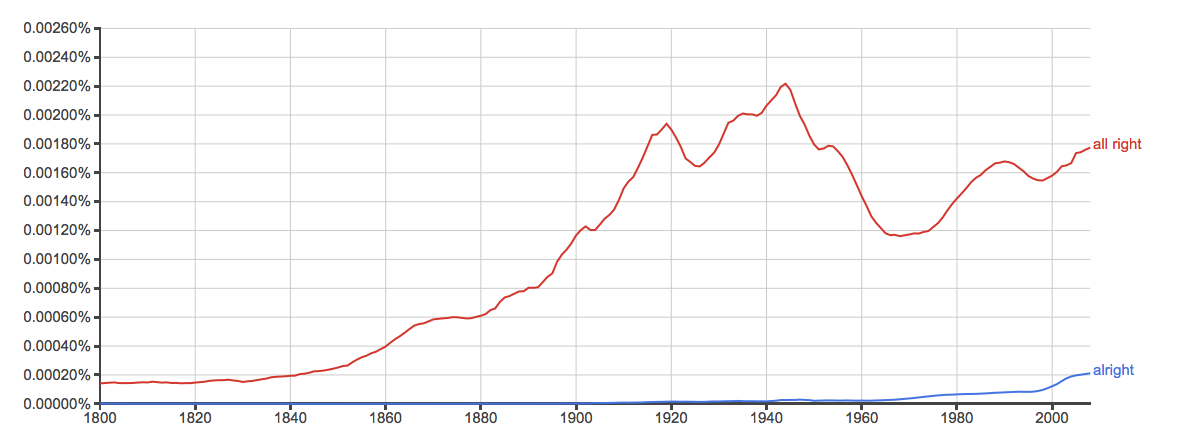The use of alright (one word) and all right (two words) is one that confuses many writers, especially young writers who may not even be aware of the debate behind the two forms.
It is easy, however, to mistake the two for one another. After all, when you say them verbally, there’s no telling them a part. They sound identical in speech, but which option should be used in written communications? Or can they both be used?
Today, I want go over the differences between these words, talk about their histories, and give you a few tricks to remember which is which for the future. After reading this post, you shouldn’t ever mix up alright vs. all right again.
When to Use Alright
 Alright is the nonstandard variant of the two-word all right. It is widely considered incorrect and is best to avoid in your writing, especially any type of formal writing.
Alright is the nonstandard variant of the two-word all right. It is widely considered incorrect and is best to avoid in your writing, especially any type of formal writing.
- The show we went to last night was alright. (Incorrect)
- I felt alright after I left the restaurant. (Incorrect)
As time unfolds, however, we see alright being used with greater frequency. As the below graph shows, from the 1970s onward, alright has seen its use increase considerably, signaling that it may eventually become standard as other words such as altogether and already once did.
Altogether and already are much older and much more established words, however, dating back to the Middle Ages. Alright is a relatively new variant, with a first recorded use in 1893.

For this reason, the two-word all right still dominates in popular usage and is much more heavily preferred, being used at a rate 8 times that of the one-word alright.
In fact, in the 2009 American Heritage Dictionary usage survey, two-thirds of the Usage Panel rejected the use of the one-word alright, while over 90 percent accepted the two-word all right is similar constructions.
Things may change in the future, but when writing an essay for school or book for publishing today, you should avoid the use of the single-word alright.
When to Use All Right
 All Right, as two words, is a phrase that can function as both an adjective and an adverb. All right has a few different meanings: in proper or satisfactory condition; acceptable, allowable; in a satisfactory way; adequately. For example,
All Right, as two words, is a phrase that can function as both an adjective and an adverb. All right has a few different meanings: in proper or satisfactory condition; acceptable, allowable; in a satisfactory way; adequately. For example,
- The mechanic looked at the brakes to see if they were all right. (Adjective)
- If school is cancelled today, that is all right by me. (Adjective)
- I did all right, considering all the pressure. (Adverb)
Anytime you are looking to use all right, it should appear as two separate words. As I mentioned above, the single-word alright is generally considered an error and your instructor or editor will probably strike it out.
In order to avoid any unnecessary mistakes, it’s best to just remember that, in this case, two words is the answer.
Remember the Difference
Alright is not all right.
The above sentence is a good memory tool to remember which option to use in your writing.
Summary
Confusing the words all right vs. alright can be an embarrassing and unnecessary mistake in your writing.
Alright, one word, is considered to be a spelling error and should be avoided.
All right, two words, is the preferred form. It is the older form and is used much more frequently than alright.
Contents
